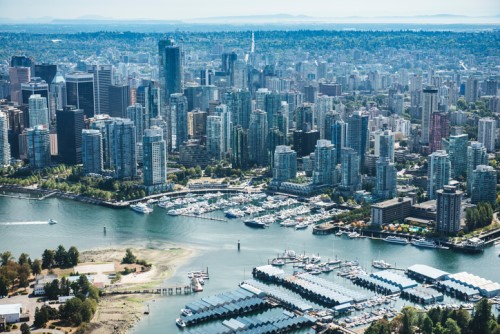Things have been pretty good for commercial real estate in the Vancouver market this year and 2020 is looking like another strong year.
CBRE Canada reports that the market has exceeded expectations in 2019 even with the backdrop of global instability; and for the year ahead it sees record low vacancies and soaring rents.
Among the highlights are the office sector where the vacancy rate fell to 2.4% in the third quarter of 2019, the second lowest in North America. Meanwhile, industrial space was also at a near-record low of 2.5%.
Even with new supply becoming available, it is quickly being absorbed.
“Rising rents might not be great news for tenants, but it makes new construction more viable in the face of rising costs. New supply is the key to alleviating space constraints and rising costs,” said Jason Kiselbach, Senior Vice President and Managing Director for CBRE in British Columbia.
Investment in Vancouver’s CRE sector rivals global peers and is driven by factors including population growth, a thriving tech sector, and the rise of ecommerce which is exacerbating demand for logistics and distribution facilities.
“One factor in Vancouver’s favour that might come as a surprise is that we are actually cost competitive,” Kiselbach said. “Even with office rental rate increases, Vancouver is still cheap relative to other gateway marketlike Seattle and the Bay Area, where rents and wages combined are 71% and 101% higher respectively.”
Trending for 2020
Kiselbach sees several key trends for 2020 and beyond:
- No relief in vacancy or rents: Vancouver has experienced record-low office vacancy and industrial availability, leading to rising rents. And CBRE is not forecasting vacancies to rise in either segment in 2020, based on the pre-leasing deals that have been done with tenants that are new to the market or expanding.
- Local operators hit hardest: That lack of available space and rising rents will impact local and regional operators the most, particularly those looking to grow. “Larger multinational tenants who require prime locations and access to talent will be able to afford the rising cost of entry into the Vancouver market and continue to drive demand for space,” Kiselbach said.
- Multi-storey warehouses: CBRE expects to see new forms of development start to re-shape the market in the coming years, including the first multi-storey logistics fulfillment centre in Canada.
- Capital attraction: For real estate owners, rising rents will increase deal sizes and attract capital. “Most institutions are under-allocated on Vancouver,” said Kiselbach. “We expect them to be more creative in terms of build-form and deal structure in order to get a piece of this market.”
Steve Randall has more than three decades of media experience encompassing online, newspapers, magazines, radio, and podcasts. He focuses on insights and news for professionals in finance, real estate, and legal services. Steve writes for multiple Key Media titles in Canada, United States, Australia, and New Zealand.








